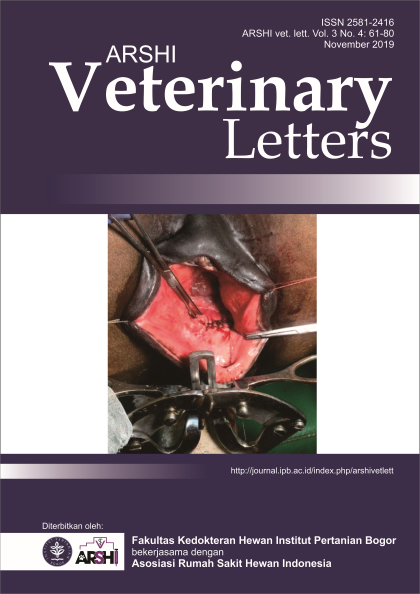Chronic diarrhea in west highland white terrier caused by hyperthyroidism
Abstract
A 8-years old, female West Highland White Terrier, with a 7-month history of diarrhea and sometimes hematemesis, polyuria and polydipsia. The antibiotic, antihelminthic, antiprotozoal, vitamin and diet changing was given by the previous veterinarian, diarrhea was stopped for a while but the diarrhea reappear. The clinical symptoms was chronic diarrhea, polyuria, and polydipsia. Physical examination revealed a swelling in ventrolateral neck area suspected a enlarge thyroid gland in right side. Blood analyses performed a markedly elevated thyroxine (T4) level and increased alkaline phosphatase (ALP). An urinalysis revealed decreases specific gravity (hypostenuria). From an examination, the diagnose hyperthyrodism has been made. The dog was treated by unilateral thyroidectomy. Histopathology of thyroidectomy was thyroid adenoma. A month after surgery, diarrhea was gone and polyuria and polydipsia was betterDownloads
References
Hall EJ, German AJ. 2010. Diseases of the Small Intestine In: Ettinger SJ, Feldman EC, editors. Textbook of Veterinary Medi-cine ‐ Diseases of the Dog and the Cat, 7 ed Philadelphia (US): Saunders.
Feldman EC, Nelson RW. 2004. Canine and Feline Endocrinology and Reproduction. 4th ed. Philadelphia (US): Saunders.
Copyright (c) 2019 CC-BY-SA

This work is licensed under a Creative Commons Attribution-ShareAlike 4.0 International License.
Authors who publish with this journal agree to the following terms:
1. Authors retain copyright and grant the journal right of first publication with the work simultaneously licensed under a Creative Commons Attribution License that allows others to share the work with an acknowledgement of the work's authorship and initial publication in this journal.
2. Authors are able to enter into separate, additional contractual arrangements for the non-exclusive distribution of the journal's published version of the work (e.g., post it to an institutional repository or publish it in a book), with an acknowledgement of its initial publication in this journal.
3. Authors are permitted and encouraged to post their work online (e.g., in institutional repositories or on their website) prior to and during the submission process, as it can lead to productive exchanges, as well as earlier and greater citation of published work (See The Effect of Open Access).


.jpg)















